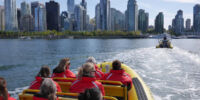
What Does it Mean to be Disability Aware?
Author: Melanie Scott (April 2018) repurposed with permission from the Rick Hansen Foundation.
Being disability aware means taking a look at your current perceptions about people with disabilities and being more mindful of how you think and act around them.
People with visible disabilities may look different – some may use wheelchairs or other mobility devices; some may use canes and service or guide dogs; some may have facial qualities such a cleft palette or a skin condition, or display the visual effects of medication, such as a tremor.
Sometimes, people with disabilities notice people staring at them, or notice the opposite – people looking away or pretending they aren’t even there. They see the disability, not the person.
The more mindful we are in trying to understand the experience of having a disability, the more we can help break down the long-held social stigmas about what people with disabilities are like and what they can do. And we can create truly inclusive relationships and communities.
When you meet or interact with someone with a disability, are you worried about how to act or what to say? Here are three easy things you can do to be more disability aware:
Start with hello.
Make eye contact and say hello! Introduce yourself and offer to shake hands, even if the person appears to have limited use of their hands or arms. If the person can’t shake hands, just wave. Then continue making eye contact. If they are accompanied by a companion or interpreter, speak directly to the person with the disability and talk as you would with anyone else.
Be respectful of personal and public space.
A wheelchair or other mobility device, including canes used by people who are blind or have low vision, is a part of their physical space. Don’t lean on, hold, or push someone’s mobility device unless specifically asked. As well, don’t pet or play with a working guide or service dog. Assistance animals have been trained to help people with disabilities find their way through public areas, alert them to sounds, and perform other tasks such as opening doors. To ensure people with disabilities can safely access our community spaces, it’s important to remember that accessible washrooms and parking spots are essential. Please don’t use these amenities even if it’s “just for a minute.”
Don’t be afraid to ask questions.
If you’re unsure what to do, just ask! Not everyone who has a disability needs help. Whether it’s opening a door or offering your arm, or learning the best way to communicate with them, check in with the person to see what’s most helpful. Being upfront about how to respond best to their needs shows respect and helps to break the ice.
Here’s an awesome PSA video by the District of Columbia’s Office of Disability Rights that explains how you can interact with people with disabilities and “End the Awkward.”





